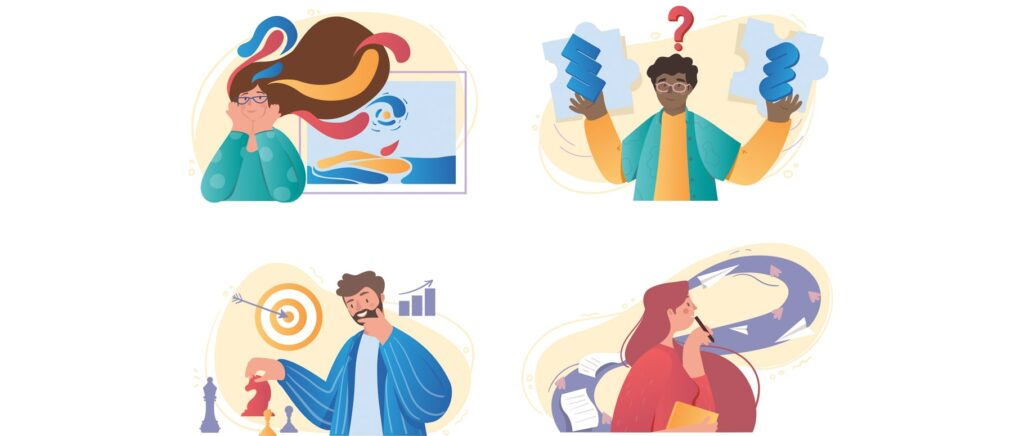
Looking for a double
Socionics states that all mankind can be divided into sixteen psychological types. For each type, only one of the sixteen is the best partner, the doula. This is not a second self that is like you in every way. Two right hands cannot make a whole; one hand must be left and the other right. He can do things you can’t do and needs the help you can give him. If you have a pathological aversion to the kitchen stove, and to screw in a new light bulb, you call an electrician, then your double – a man who likes to work with his hands. But he, too rational and does not understand people, may be very necessary your ability to turn everyday life into a holiday or notice unreliable people among colleagues.
The colors that sociologists use to paint a portrait of a psychotype are the four paired functions identified by Carl Gustav Jung (sometimes under a different name): extraversion – introversion, sensitivity – intuitiveness, logic – ethics, rationality – irrationality. According to the first three, the duals are opposite to each other, for example, if one is a logical-sensory extrovert, the other is an ethical-intuitive introvert. But both must be either rationalists or irrationalists. What is behind each of these titles?
Struggling with yourself? Take a lunch break!
We’re used to being called an extrovert, a sociable fun-loving person, and an introvert, a withdrawn, pouty detached person. But it’s more complicated than that. An extrovert can also be sullen and taciturn, if in this way he can… attract attention to himself. After all, extroverts and live that are trying to declare to the world about their existence: make suggestions, dress spectacularly, if you want to easily make acquaintances. They generously squander their energy, which sometimes leads to depletion of energy reserves – diseases, depression, etc. But when given the opportunity to rest, the extrovert rushes back into action.
When making a decision, the extrovert focuses on the “realism of practical life”, trying not to be subjective. If something does not go well in communication with people, he changes either himself or people. Pygmalion complex, who tries to mold the woman of his dreams out of his beloved – this is extroverted stuff. Another option is a persistent struggle with himself: he sincerely believes that if he becomes a little better (more restrained, kinder, etc.), there will immediately be peace and grace around him.
The introvert is a bit self-centered. He more often changes relationships (marital to friendly, friendly to official): it is easier to leave than to adapt, because for him his inner world is of greater value than the blinding reality.
The introvert sparingly spends his energies. He will figure out how to “find internal reserves” (improve window dressing, quality of service) instead of taking out loans, expanding the network, etc. Introverts force extroverts to “slow down”, saving them from overheating: “It’s lunchtime,” a hungry introvert insistently rubs an extrovert who is enthusiastic about work.
The extrovert needs the introvert to keep him from getting mossy on his own couch in front of the TV or computer. He will take him to the theater, push him into the office for an interview with a profitable employer, or organize his own company to implement ideas that the introvert can generate but cannot implement (it is difficult for him to convince others of his rightness).
Who the logician is happy to see and where are the ethicist’s points
A logician communicates with people mainly to solve business issues. Logician’s feelings can be very vivid and deep, but it is difficult for him to understand them, and therefore – to control, so he prefers to hide his feelings. Sometimes, if they come out, they are so strong that they frighten everyone, including the logician himself. After that, he shoves them inside himself with even greater zeal.
The right of emotions to exist is something that ethicists help logicians realize. They talk a lot about feelings and relationships. Being good at understanding people, they tell logicians who appreciates them and who uses them, when to say “nice to see you” and when to say “sorry, busy”.
The logician helps the ethicist, who is not sure of the strength of his mind, to realize his intellectual potential. In one situation he will ask a question that will suddenly clarify everything (“I can’t find my glasses!” – “What was the last thing you read?” – “A recipe book. Here they are – on the fridge!”), in another to help organize a jumble of thoughts (“Your design ideas are interesting. Write them down in the order in which you want to realize them”).
Space is for you, time is for me.
Sensory and intuitive people brotherly share two basic dimensions of the world: space (sensory) and time (intuitive). Sensory people are good at remembering faces, names, dates, and orienting themselves on the ground. Sensory people pay more attention to detail. They have “smart” hands. It is not a problem for them to fix an iron broken by an intuitive, to cook dinner, to put things in order.
Hands intuit often do not lift anything heavier than a book, and order they are more willing to bring order in the plans for the future, not things. However, there are “trained” parents intuit, who are regularly engaged in cleaning, and sensorics, not accustomed to put things in place. But if you look closely, you can see: such a neat intuit something always falls to the ground, scattered, spilled – often directly on the clothes. But slob-sensoric can pour compote from the pot into the narrow neck of the decanter, without dropping a drop. Sensorics, for whom the future is closed by an iron curtain, turn to him for predictions. “What do you think will come of it?” – asks a sensory intuitive, who grasps on the fly the general essence, patterns – everything that helps to guess how events will develop further. Sensorics have a good sense of their body and know how to dress stylishly. For intuitives, looking decent is a problem. It is easier for them to cope with this task in the company of a sensory doula who tells them what to wear and how to cut their hair.
Aims and means
The rational’s goals are strictly defined and hierarchized. Already at school he knows: he will go to medical school, he will get married after twenty-five years of age, and he will occupy a leading position before thirty. He does not forget about any of his goals even for a moment. In high school, he works part-time as an orderly in a hospital, while looking for a suitable party among the plastered patients. If he doesn’t manage to get into medical school right away, the rational doesn’t get discouraged. He will go to medical school, and then he will apply again. If personal happiness could not be found before the “critical” age, it is the rational who will decide to buy a newspaper with marriage advertisements, place his/her profile there, etc.
The irrational can also do all this, but not for the purpose of finding a life partner, but for fun. He does not burden himself with far-reaching plans, but uses chance. If a competent medical student is offered to work in a medical newspaper, the rational can refuse: his task is to work in his specialty, not social activities. The irrational will accept the offer and, perhaps, thanks to the acquaintances made through the newspaper, will find his place in life.
When communicating with people, rationals look at them through the glass of past experience. Their reactions are somewhat stereotyped and therefore instantaneous. Did he raise his voice? He gets angry and raises his voice in response. Called greedy? Outraged. Irrationals perceive every situation as a new one, trying to “fit” into it as much as possible. Therefore, their response is often a little slow. When they hear the same accusation of stinginess, they may not react immediately and only after a couple of minutes take offense (“Why am I greedy?”) or crack a joke (“Love me as I am!”)
It is difficult for the rational to get along with the irrational: while the irrational thinks whether to be offended or pleased, the rational, programmed to respond immediately, is exhausted from waiting. They cannot agree on what to strive for: the rational regularly puts aside money for repairs, while the irrational tries to withdraw funds from it with the same regularity – either for a new telephone or for an old samovar.
Let’s analyze
If you have understood that you are characterized, for example, by logic, intuition, introversion and rationality, then you are a logical-intuitive introvert. Rationality or irrationality is not written down in this formula, but it determines the order of characteristics: rationals have logic or ethics in the first place, while irrationals have intuition or sensorics. That is, an irrational with the same characteristics is called exactly the opposite – an intuitive-logical introvert. And now we create a mirror image of these formulas and get the “cipher” of duals: a logical-intuitive introvert (rational) dual is an ethical-sensory extrovert, an intuitive-logical introvert (irrational) is a sensory-ethical extrovert.
If you have come to the conclusion that the person you love is not like your doula, don’t get depressed. You may have made a mistake in “diagnosing”. Often the real type is difficult to determine, because we so conscientiously disguise some shortcomings that a well-learned role by necessity becomes our second self. Thus, an intuitive, worried about his untidiness, willpower may force himself to keep the house in order, and you will confuse him with a sensoric. In addition, some aspects, regardless of the type to which you belong, are actualized in different periods of life: in childhood, sensorics rule, in youth – ethics, in mature years – logic, and in old age – intuition.
But even if you are sure of your partner’s type and it doesn’t suit you, you shouldn’t be upset. Each of us has a mind to figure out how to do better and a heart to find the strength to do it. Knowing what your partner needs (if intuitive – in caring about his physical comfort, if sensory – in clues about future plans, etc.), you can try to give it to him. Look, in time, your relationship will become so harmonious that you will wonder if it is not a double living next to you?
Shutterstock/FOTODOM UKRAINE photos were used



